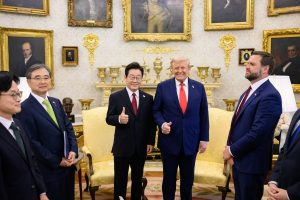On September 4, U.S. Immigration and Customs Enforcement (ICE) detained 475 workers at Hyundai’s battery plant in Georgia. Approximately 300 of the detainees are South Koreans, prompting Seoul to swiftly engage in dialogue with Washington to resolve the issue.
According to the South Korean Presidential Office, Seoul is sending a chartered plane to Atlanta on September 10 to repatriate the detainees. Foreign Affairs Minister Cho Hyun flew to Washington to meet his counterpart, U.S. Secretary of State Marco Rubio, to finalize the process of bringing the South Korean detainees back home.
Regardless of the reasons for the detentions, U.S. President Donald Trump’s moves appear to show little regard for one of the United States’ closest allies, a pattern that has continued since he launched a tariff war against the entire world, with no distinction between friend and foe.
Based on news reports, the primary reason for the mass detentions was the allegation that the workers were on invalid visas, classifying them as illegal aliens. Even if the South Korean workers had invalid visas, it makes no sense for Washington to approve such an extensive ICE raid on the factory of a South Korean corporation it had demanded to make further investments.
Just weeks before the raid, Hyundai pledged to hike its U.S. investment to a total of $26 billion as part of the broader economic diplomacy during South Korean President Lee Jae-myung’s summit with Trump. While Trump has repeatedly demanded foreign investment in the United States, it seems that his administration also wants these foreign corporations to hire American citizens for their U.S.-based factories.
South Korea is a critical U.S. ally in East Asia, and regardless of the circumstances, the detention of approximately 300 South Koreans with no prior notice given to the South Korean government is unacceptable.
Within hours of the news breaking, there were voices in South Korea demanding that the government investigate Americans who are working as English teachers in South Korea.
Lee said on Tuesday that he feels tremendous responsibility over the incident. He also said his government will work with the United States to improve a system through close coordination.
In order to tackle Trump’s tariff negotiations and strengthen the bilateral alliance between the two countries, Lee has repeatedly appealed to him as the friendly South Korean president working for the interests of the U.S. However, Washington’s behavior toward South Korea since the beginning of Lee’s term demonstrates that it no longer values the alliance with South Korea. Instead, the Trump administration seems to see South Korea, and all other developed countries, as piggy banks that can be raided to contribute to the development of the U.S. economy.
Trump has made continuous threats toward South Korea, demanding that it provide more economic assistance to the United States. According to local news reports, Washington reportedly demanded that the top South Korean major corporation, Samsung Electronics, to give it shares after the U.S. government gained a 10 percent stake in Intel.
Demanding that South Korean corporations make billions of dollars in investments to the U.S. and even give a certain amount of shares to the U.S. government cannot be interpreted as a gesture strengthening the alliance and ties with South Korea. It is even more astonishing to make such demands and then target a company that has complied with a massive immigration raid.
South Korea is one of the countries that is dealing with a high rate of youth unemployment. While grappling with North Korea’s nuclear threat and the strategic competition between the U.S. and China, South Korea now has another major task to deal with – which is ironically generated by its most important ally, the United States.
Trump’s term will end on January 20, 2029. Although his administration seems filled with pro-Trump officials, policymakers and politicians from both the Democratic Party and the Republic Party should closely communicate with key allies such as South Korea, Japan, European Union, and other countries affected by Trump’s business-style leadership and diplomacy. Allies need reassurance that the United States is only temporarily a protectionist state, and will eventually return to value-based democracy and free trade, which are cornerstones of the liberal international order.

































